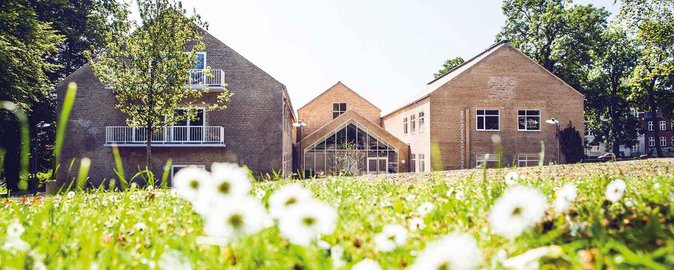- Education
-
Research
Current research
Talent
-
Collaboration
Businesses
Government agencies and institutions
Alumni
-
About AU
Organisation
Job at AU
With the new Aarhus Institute of Advanced Studies (AIAS), Aarhus University is offering excellent researchers from all over the world and a wide range of fields the freedom to devote themselves to their work in an attractive setting.
2013.09.10

AIAS opened on 13 June 2013 in a newly renovated facility in the heart of the University Park. Here, up to 35 so-called fellows will have the freedom to devote themselves to their research for a period of several years.
AIAS is the first institution of its kind in Denmark. In establishing AIAS, Aarhus University was inspired by the example of analogous institutions abroad, such as the Institute for Advanced Study in the US, which has close links with Princeton University.
»AIAS is a centre for excellence. A place for researchers at the very highest level. Researcher are selected exclusively on the basis of their qualifications. We recruit the best, and then they can pursue their research interests as they see fit,« explains Morten Kyndrup, director of AIAS.
For Aarhus University, AIAS is a long-term investment that will provide returns in the form of strong international relationships and networks for many years to come.
»AIAS will help place Aarhus University on the mental map of research – as a place that emphasises the importance of independent basic research, and where researchers of the highest international standard have the opportunity to work under such favourable conditions that they’ll be able to take decisive steps forward in their research. Later on, of course, they will remember that those steps were taken at Aarhus University. But what AIAS is ultimately about is Aarhus University’s desire to encourage the production of strong research results – both in Denmark and in an international perspective,« says Kyndrup.
In Kyndrup’s view, AIAS will become a cornerstone of AU’s internationalisation strategy.
»Our fellows bring the great world into Aarhus University - and when they leave again, they take Aarhus University out into the great world with them,« he says.
Kyndrup explains that affiliated researchers are encouraged to organise lectures, workshops and symposiums to bring their international colleagues to Aarhus. AIAS fellows are also encouraged to arrange lectures in collaboration with AU researchers.
»In this way, we forge concrete connections between AU and our fellows that we hope the researchers will be able to build on,« says Kyndrup.
In addition to freedom of research, AIAS offers its research fellows access to facilities of an unusually high standard.
»Aarhus is obviously not Paris, and even though Aarhus University is doing very well internationally and has become quite a sizeable institution, we can’t yet compare ourselves with Cambridge or Harvard. But we can point to the fact that we have the courage to launch major new initiatives. What we’ve achieved with AIAS is attractive by any measure, even in comparison with similar institutes abroad,« says Kyndrup.
Freedom to pursue their research without other commitments is a rarity for researchers in Denmark and abroad. The modern university has evolved into a mass university, and to a great extent, research activities are based on external grants, which involves applying for funding for a project considered useful or relevant in the eyes of others. As Kyndrup puts it, the university has become instrumentalised.
»AIAS is not an attempt to depart from this »main road« at the universities, but rather to demonstrate that there’s also room for something else. With AIAS, we’ve created a little piece of the classical university in the middle of the instrumental mass university. Not as an alternative, but in order to demonstrate that Aarhus University can and will include both.«
ABOUT AIAS
AIAS opened on 13 June 2013 in a newly renovated facility in the University Park, the central AU campus. The institute will offer up to thirty-five fellows at a time the freedom to devote themselves to their research for a terms of between one and three years. AIAS does not interfere in the content, purpose, aims and method of the research performed at the institute. The only requirement researchers must live up to is excellence.
AIAS stipends for Danish and foreign researchers are financed by Aarhus University and the Aarhus University Research Foundation.
AIAS distinguishes between internal and external fellows. Internal fellows are researchers who are already affiliated with Aarhus University. Their stipends are called Jens Christian Skou Fellowships in honour of Aarhus University’s first Nobel Prize Laureate, who received the Nobel Prize in Chemistry in 2007.
External fellows are researchers without a prior affiliation with Aarhus University. These researchers typically come from abroad. Their stipends are called Dale T. Mortensen Fellowships in honour of the American professor of economics who was awarded the 2010 Nobel Prize in Economic Sciences. Mortensen has a close collaboration with AU researchers in the field of labour market economics and has held a Niels Bohr Visiting Professorship at AU.